
How many doctors has he seen today?
More than two million Americans had substance abuse disorders involving prescription painkillers and an additional 591,000 had substance use disorders involving heroin in 2015, according to the most recent data shared by the American Society of Addiction Medicine (ASAM). In order to support these addictions, many end up turning to desperate measures. One increasingly common phenomenon? “Doctor shopping.” Here’s a closer look at the problem, along with initiatives currently underway aimed at stopping this potentially deadly practice.
The 411 on Doctor Shopping
According to “Doctor Shopping: A Phenomenon of Many Themes,” published in Innovations in Clinical Neuroscience, “Doctor shopping is defined as seeing multiple treatment providers, either during a single illness episode or to procure prescription medications illicitly.” In some cases, clinical factors, such as scheduling issues, qualities of individual physicians, and lack of communication, lead to doctor shopping. In other instances, however, doctor shopping is driven entirely by the seeking of illicit prescription medications.
Unfortunately, doctor shopping by prescription drug seekers can lead to dire consequences. Not only is drug abuse the leading cause of accidental death in this country, but CDC data reveals that the majority of all deaths resulting from drug overdoses are caused by prescription drugs. Of these, three-quarters involve prescription opioid pain relievers (OPRs). In other words, the vast majority of people fatally overdosing on drugs are doing so with prescriptions.
Regulations Regarding Doctor Shopping
It makes sense that the more access people with addiction problems have to drugs, the more likely they are to overdose. Because of this, more states–primarily responsible for regulating and enforcing prescription drug practice–are stepping up to prevent doctor shopping.
According to the CDC, all 50 states and Washington, DC have general fraud statutes including provisions derived from either the Uniform Narcotic Drug Act of 1932 and the Uniform Controlled Substance Act of 1970, the former of which states that “no person shall obtain or attempt to obtain a narcotic drug, or procure or attempt to procure the administration of a narcotic drug . . . by fraud, deceit, misrepresentation, or subterfuge or . . . by the concealment of a material fact . . . .”
Additionally, 20 states have specific doctor shopping laws which, according to the CDC, “prohibit a patient from knowingly withholding information from the practitioner the patient is currently seeing about controlled substances or prescriptions they have received from other healthcare practitioners.”
States Step Up Against Opioids
States are also stepping up by enlisting health care professionals in the fight against prescription drug abuse deaths related to doctor shopping.
Not only can physicians now consult a database of federally controlled substances, including opioid painkillers, dispensed in their states, but they can also specifically check an individual patient’s opioid medication history and other prescription drugs to determine whether there’s a substance abuse problem and/or the risk of an overdose death. This can also help prescribers determine when a patient is already receiving meds from other sources.

More states are aiming to keep prescription drugs out of addicts’ hands.
Additionally, several states, led by Kentucky, have taken it a step further by now requiring prescribers to first check a patient’s prescription drug history using an electronic database called a prescription drug monitoring program (PDMP), according to a report from the Pew Charitable Trusts.
Given the rising epidemic of prescription drug overdose deaths in this country, the value of taking steps to proactively prevent doctor shopping cannot be overstated–particularly when you factor in that patients who doctor shop are not only at high risk of substance abuse and overdose but are also likely to be selling drugs illicitly.
Also of vital importance when it comes to helping people addicted to prescription drugs kick the habit and recover? Substance abuse treatment programs.
We’re Here to Help
Contact us today to learn more about how Harris House can help you.
Photo credit:
Vic at flickr.com







